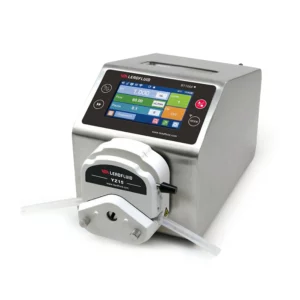Choosing the right China peristaltic pump pharmaceutical manufacturer requires careful consideration and evaluation.
Here are some key factors to consider when selecting a manufacturer:
- Good Manufacturing Practices (GMP) Compliance: Ensure that the manufacturer follows GMP guidelines for pharmaceutical production. GMP compliance ensures that the manufacturer maintains high standards of quality, safety, and hygiene in their manufacturing processes.
- Experience and Expertise: Look for a manufacturer with significant experience in producing peristaltic pumps specifically for the pharmaceutical industry. Their expertise in understanding the unique requirements and regulatory standards of the pharmaceutical sector is crucial for ensuring the quality and suitability of the pumps.
- Quality Control and Certifications: Inquire about the manufacturer’s quality control procedures and certifications. They should have robust quality assurance processes in place, such as testing, inspection, and adherence to relevant international standards like ISO 9001 and ISO 13485 (specific to medical devices). These certifications validate the manufacturer’s commitment to quality and compliance.
- Customization and Compatibility: Assess the manufacturer’s ability to customize peristaltic pumps to meet your specific pharmaceutical requirements. Consider factors such as flow rate, pressure, tube material compatibility, and other specifications necessary for pharmaceutical applications. The manufacturer should be able to tailor the pumps to suit your needs.
- Regulatory Compliance: Verify that the manufacturer complies with relevant regulatory requirements for pharmaceutical manufacturing. Depending on your location, this may include adherence to regulations set by the U.S. Food and Drug Administration (FDA), European Medicines Agency (EMA), or other regional regulatory authorities.
- Documentation and Traceability: Check if the manufacturer maintains comprehensive documentation and traceability records for their peristaltic pumps. This includes material certificates, manufacturing process records, and batch/lot tracking information. Good documentation practices are crucial for quality control, product traceability, and regulatory compliance.
- Cleanroom Facilities: Evaluate whether the manufacturer has dedicated cleanroom facilities or manufacturing areas with controlled environments suitable for pharmaceutical production. Cleanrooms help minimize contamination risks and ensure the integrity of the pharmaceutical products.
- After-Sales Support and Service: Consider the manufacturer’s after-sales support, technical assistance, and availability of spare parts. A reliable manufacturer should provide prompt assistance, offer maintenance and repair services, and have a sufficient supply of spare parts to minimize downtime.
- Reputation and References: Research the manufacturer’s reputation in the industry and seek references from their existing pharmaceutical clients. This will give you insights into their track record, customer satisfaction, and overall reliability.
- Communication and Responsiveness: Evaluate the manufacturer’s communication skills and responsiveness. Effective communication is crucial for understanding your requirements, addressing concerns, and maintaining a smooth collaboration.
It’s advisable to conduct thorough due diligence, china peristaltic pump pharmaceutical manufacturer review the manufacturer’s capabilities, and potentially visit their facilities or request samples for evaluation. This will help you assess their suitability as a peristaltic pump pharmaceutical manufacturer and ensure they can meet your specific needs and regulatory requirements.
Where are peristaltic pump pharmaceuticals used?
Peristaltic pumps find various applications in the pharmaceutical industry due to their ability to handle sensitive fluids and maintain sterility.
Here are some common areas where peristaltic pumps are used in pharmaceuticals:
- Drug Manufacturing: Peristaltic pumps are used in drug manufacturing processes for transferring and dosing liquids, including active pharmaceutical ingredients (APIs), solvents, reagents, and excipients. They ensure accurate and controlled delivery of fluids during formulation, compounding, and mixing processes.
- Bioreactor Feeding: Peristaltic pumps are utilized in biotechnology and biopharmaceutical applications for feeding nutrients, media, and additives into bioreactors. They provide precise and sterile fluid transfer, crucial for maintaining optimal conditions for cell culture and fermentation processes.
- Media and Buffer Preparation: Peristaltic pumps are used for preparing and transferring culture media, buffers, and solutions in pharmaceutical laboratories and production facilities. They ensure accurate and contamination-free delivery of fluids during the preparation of growth media for cell cultures and various analytical processes.
- Sterile Liquid Transfer: Peristaltic pumps are employed for sterile liquid transfer in pharmaceutical manufacturing and compounding. They are used for aseptic filling, vial filling, syringe filling, and other applications where maintaining sterility and preventing contamination are critical.
- Sampling and Analysis: Peristaltic pumps are used for sampling and transferring pharmaceutical products for analysis and quality control purposes. They facilitate the collection of representative samples from batch processes, ensuring reliable testing and compliance with regulatory requirements.
- Parenteral Nutrition: Peristaltic pumps are utilized in the preparation and administration of parenteral nutrition, which involves delivering nutrients directly into the bloodstream. They provide accurate and controlled infusion of nutrient solutions, ensuring patient safety and precise dosing.
- Intravenous (IV) Drug Administration: Peristaltic pumps are employed in hospitals and healthcare settings for delivering IV medications and fluids to patients. They ensure precise and controlled infusion rates, reducing the risk of medication errors and providing consistent therapy.
- Research and Development: Peristaltic pumps are used in pharmaceutical research and development laboratories for various applications, including drug discovery, formulation studies, and pharmacokinetic analysis. They provide accurate and controlled fluid transfer during experimental procedures and testing.
These are just a few examples of the applications of peristaltic pumps in the pharmaceutical industry. The pumps’ ability to handle sensitive fluids, maintain sterility, and provide accurate fluid transfer makes them suitable for numerous pharmaceutical processes, ensuring product quality, patient safety, and regulatory compliance.

